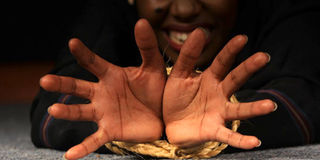Where do you report an abusive relationship?

What you need to know:
- There are many reasons people choose not to disclose that they are being abused. Culturally, we are conditioned to believe marriages have such hardships so we strive to endure whatever comes our way.
- There is also the element of shame and pride, the victim does not want to expose their relationship to the world.
It is unfortunate to realise that our society has trained us to expect hardships and difficulties in marriages and relationships. Many sengas will counsel their daughters to remain stoic in the face of any difficulties. “Guma (be strong),” they tell you when you feel like you cannot take it anymore. This cultural conditioning makes it difficult for most people to realise that their partner is actually abusing them.
Those who recognize it are reluctant to confide to anyone lest they be labelled dramatic. But the reality is abusive relationships in our communities are abundant and are growing. And because of the lacklustre way this problem is treated, we see a corresponding growth in domestic violence.
Do you know if you are being abused?
Although scenarios might differ but experts say if your partner’s behaviour makes you feel small, controlled or as if you are unable to talk about what is wrong, it is abusive. If you feel like your partner is stopping you from being able to express yourself, it is abusive. If you feel you have to change your actions to accommodate your partner’s behaviour, it is abusive.
Where should victims report?
Sarah Jesca Agwang, a gender expert at Uganda Women’s Network (UWONET), explains that the lockdown has forced people to seek for other alternatives other than police which has proven far away from the people.
Agwang reveals that currently the most reliable remedy is family in that if one suspects abuse he or she should notify a close family member who can in turn offer counsel or keep track of the matter.
“A relationship happens between two people and what comes close to the two is their families. It is important that at a time when things go wrong, you have to involve family to get issues resolved,” she explains.
Much as Agwang believes that the climax should be the police, she notes that in the current situation, the justice system might be a little bit strained and accessing the police could prove harder than usual because of the Covid lockdown guidelines. “With curfew in place, it will not be easy to access police at night yet most abuses take place at night in most families.
This inaccessibility is making people lose confidence in the ability of the police to intervene and offer them protection,” she notes. She advises victims who find themselves in a situation of urgency and unable to access police at that particular time, to run to neighbours for protection. “Most people are now aware of gender based violence and are willing to put a stop to it,” she says.
Women rights activist Sarah Nsigaye Kizza notes that abusive relations could be lessened by people taking more interest in each other and strengthening communal relationships. She suggests a return to a time before families started isolating themselves in perimeter walls when people took interest in each other’s wellbeing.
“If you do not greet your neighbours, you do not associate with anyone then it will be hard for them to notice if anything wrong is happening to you and even awkward for you to seek their help,” she notes.
In the absence of police intervention, Nsigaye recommends the Local Council system, family, friends or religious leaders for counselling before the situation worsens. She reveals in marriages that is the job of the best man and the matron of honour who are considered the couple’s closest friends. Nsigaye, however, says that LCs should be empowered in regards to capacity building, training and facilitation since they are usually closer to the families.
Nsigaye also advises the use of social media because it is proving to be the new public police. “We have always seen police acting on stories that start online,” she adds.
The law
Any form of abuse in a relationship is illegal under the Domestic Violence Act 2010 .
The Act clearly indicates that “domestic violence” constitutes any act or omission of a perpetrator which harms, injures or endangers the health, safety, life, limb or well-being, whether mental or physical, of the victim or tends to do so and includes causing physical abuse, sexual abuse, emotional, verbal and psychological abuse and economic abuse.
The Act explains that a person in a domestic relationship who engages in domestic violence commits an offence and is liable on conviction to a fine not exceeding forty eight currency points or imprisonment not exceeding two years or to both.
The court may, in addition to imposing a fine or imprisonment, order the offender in a case of domestic violence to pay compensation to the victim of an amount determined by the court.
And most importantly, consent is not a defence in domestic violence under the Act.




